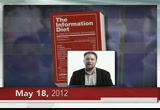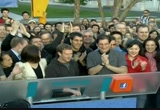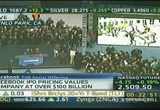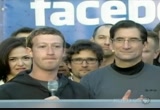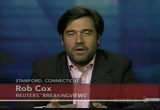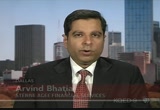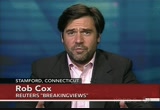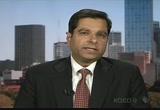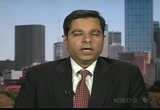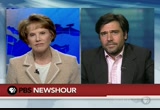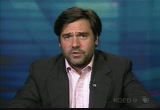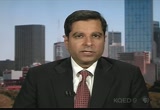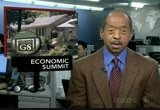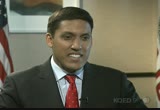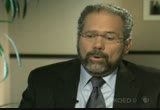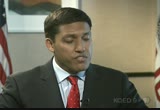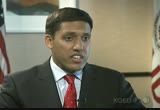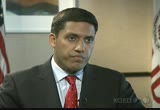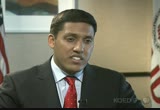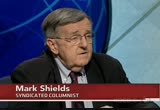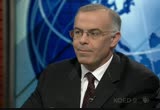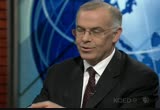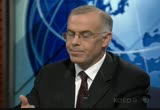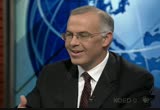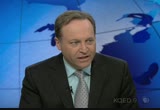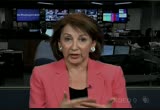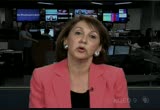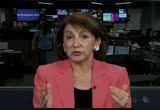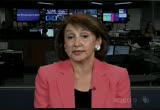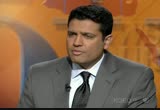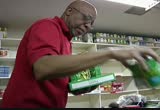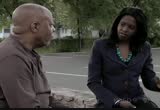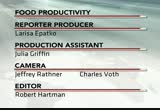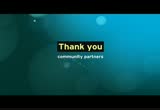tv PBS News Hour PBS May 18, 2012 6:00pm-7:00pm PDT
6:00 pm
captioning sponsored by macneil/lehrer productions >> brown: social media giant facebook went public today with a high-profile ride on wall street. good evening. i'm jeffrey brown. >> warner: and i'm margaret warner. on the newshour tonight, we assess whether facebook and its management can live up to the hype surrounding today's stock offering. >> brown: then, ray suarez talks to u.s.a.i.d. administrator rajiv shah about a new public and private sector partnership to fight hunger in africa. >> warner: mark shields and david brooks analyze the week's news. >> brown: we have an update on the trayvon martin case after florida prosecutors release over 200 pages of photos and eyewitness accounts of the shooting of the unarmed teen. >> warner: and hari sreenivasan
6:01 pm
has a conversation with author and software developer clay johnson on managing the glut of information in this digital age. >> your clips have consequences, when you're reading an article on-line, you're not just reading that article, you're voting fors it, you're telling the editor to write more stuff like that. >> brown: that's all ahead on tonight's newshour. major funding for the pbs newshour has been provided by: >> growing up in arctic norway, everybody took fish oil to stay healthy. when i moved to the united states almost 30 years ago, i could not find an omega-3 fish oil that worked for me. i became inspired to bring a new definition of fish oil quality to the world. today, nordic naturals is working to fulfill our mission of bringing omega-3s to everyone, because we believe omega-3s are essential to life.
6:02 pm
at&t and the william and flora hewlett foundation, working to solve social and environmental problems at home and around the world. >> and with the ongoing support of these institutions and foundations. and... >> this program was made possible by the corporation for public broadcasting. and by contributions to your pbs station from viewers like you. thank you. >> warner: facebook made its debut as a publicly traded company today, but investors did not "like" the stock as much as many had expected. still, the initial public offering became the third largest on record. the widely anticipated stock offering finally got underway when facebook creator mark
6:03 pm
zuckerberg rang the nasdaq opening bell from his company headquarters in menlo park, california. >> in the past eight years, all of you out there have built the largest community in the history of the world. you've done amazing things that we never would have dreamed of. and i cant wait to see what you guys all do going forward. ( applause ) >> warner: shares in the social networking giant opened at $38. and in the first 30 seconds of trading alone, 82 million shares traded hands. but after hitting a high of $45, the stock ended up gaining just 23 cents on the day. that meant the company raised more than $16 billion from its i.p.o. >> facebook, facebook, facebook, facebook... >> warner: the event was heavily hyped for days, and today, it generated buzz on the street and on the air. >> this is expected to be huge. this i.p.o. has hit the mainstream, as cramer had
6:04 pm
mentioned, with kids even wanting to put in orders, and you can see that excitement here in times square. >> warner: all this was a far cry from 2004, when facebook was dreamed up in zuckerberg's college dorm room at harvard. >> people want to go on the internet to check out their friends, so why not build a web site that offers that? >> warner: zuckerberg's story, and the site's explosive growth, was dramatized in the 2010 oscar winning film "the social network". two years later, the company has 900 million users worldwide and counting. after today, it's valued at more than $100 billion, and zuckerberg still will control about 60% of the voting shares. but he insisted today that going public will not change facebook at its core. >> right now, this all seems like a big deal. going public is an important milestone in our history. but here's the thing-- our mission isn't to be a public company; our mission is to make
6:05 pm
the world more open and connected. >> warner: still, as facebook enters the next phase of its life, some are asking if it can live up to the value the market put on it today. about 80% of its revenue currently comes from advertising. yet just this week, general motors canceled its $10 million ad budget for the site. the auto maker said the ads weren't selling cars. facebook also faces the challenge of adapting its advertising model to the growing mobile device market. >> for a closer look at all this, we turn to two people who have been tracking the company and today's developments. arvin bhatia is managing director and an equity manner with stern ag financial service, a brokerage firm and rob cox is u.s. editor of routers breaking news, a financial news web site. welcome, gentlemen, to you both, rob cox beginning with you, what did you make of today's ipo, did it fail to live up to the hype?
6:06 pm
>> you know, it was the best and the worst of american capitallism. i mean you have $100 billion company go public at which none of the people who went public with it today actually made any money. if you bought the stock, you didn't make any money, right. but a hundred billion dollars of value was created. it had all of the hype. it had all of the sort of excitement that we have in capitalism. and remember, it's an incredible creation. 900 million people connected around the world. it's brought joy, tears, laughter, annoyance, all those things. but at the same time it was sort of the ultimate deal of the .1%, the thousand or so people without got in before it went public and had $100 billion valuation, it's extraordinary. >> warner: what would you add to that the best and the worse. do you think it is a disappointment to the investors? >> well, clearly i think people are expecting a bigger increase in the stock price after the first day. normally in things like this,
6:07 pm
investors expect 10, 15% increases day one. is that didn't happen. but i want to put that in context a little bit. keep if mind that over the last few weeks, the underwriters which are the people who brought, helped the company come public, they were raising the price, the offering price of the deal. so that also caused some of the upside that we would have expected today to kind of go away. but i agree with rob, overall, i would soon consider this a big success for an eight-year-old company, started in one person's dorm. again, a symbol of american capitalism, no doubt. >> warner: and so rob cox, as you said, this is more than $100 billion. do facebook's revenues, i think that's something like a hundred times lastier's earnings. do facebook's potential revenues justify that value? >> well, look, nobody can take numbers, i mean, there are tons of analysts have come out and sort of reverse engineered an argument for
6:08 pm
supporting the stock, so you can say we foe it is $100 billion. let's figure out a way to actually make a bold case for this. let's look at the numbers. we can say it will be a slice of the advertising market and therefore it will look like this. it should have the kind of information that people will pay a ton of money for. it can be like a credit rating agency. there's a million ways to try to am could up with a number, numerical valuation for this companiment but at the end of the day, what people are betting on is that 28-year-old hoodie-clad kid mark zuckerberg coming up with a way to take the 900 million people that he's got connected, and all of the information that they have willingly given to him and find a way to make it work. and i think there's just-- a lot of people are talking about-facebook shall did -- faithbook, right there is faith in mark zuckerberg's ability to do that. and i think that is really the only way that people can justify paying $38 to $45 a share for anything in the next couple of years for this stock. >> warner: so this is really predicated on faith in the
6:09 pm
future? >> it is. you about i think there is history behind this. eight years ago when facebook was just starting, you had a company called google go public. and at that point they were destructing the billions of dollars of advertising market. currently that is a $600 billion market, by the way. and they did that with search. and today that's happening with social. so i think people have something to look at as history and point to where things can go. clearly what rob is saying, you know, about the number of people there on facebook today, 900 million people, that we think will be a billion and a half people. and that excludes china where there is another half a billion people on the internet today. some percentage of that people would come on facebook if they are able to get in that country. >> warner: so what are facebook's challenges in trying to live up to that? in other words, what do they have to do that they haven't
6:10 pm
done now. >> well, the biggest task i think they have to first continue to make sure that the user experience, you know, is really strong. people want to come back and get value. they want to spend 15, 20 mine minutes a day, that they have to continue. then from there on, the number one task there for mark zuckerberg is to keep that audience. then shell sandberg, the chief operating officer, her job is to convert that audience into money. and the way they would do that is to continue to target the ads that advertisers put on facebook in a very meaningful way that, you know, the returns that advertisers get become bigger and bigger. so those are two things that have to do in the near and longer term. >> warner: so on the advertising, first we had gm pull its advertising budget, upcoming one. what are the challenges for facebook to grow this advertising and also on the
6:11 pm
mobile devices. >> yeah, i mean i think those are the two, the big questions. and clearly certainly the mobile advertising issue was one that facebook itself highlighted in the perspec perspect-- prospectus of the ipo as a potential risk factor. but looking at gm's decision, to come out public and say it was reducing its facebook advertising is quite interesting. it tells you that they don't feel they're getting a satisfactory experience or result from that advertising. which means to arvin's point is that they need to go back to facebook, and cheryl sandberg and say what can we do with the user experience and make it more effective it is a delicate balance. as we might remember with my does space or a few people might remember, the more intrusive the experience is the less good the experience will be for the users and they will walk away. so it's quite a difficult balance. and at the same time, we're just talking, that is really about the computer experience, you know. when we talk about things like mobile, it's a whole different gamement and we are all moving much, much
6:12 pm
more aggressively than i think anyone would have thought a couple of years ago into using mobile devices, to access facebook and all other manner of web sites and information. and there's no clear way to make and monetize that experience for advertisers. so these are, you know, twofold movements that facebook is going to have to face. >> warner: can you explain why the facebook model is hard to apply to a handheld mobile. >> think of it as the real estate on a mobile phone is very limited. so the opportunity is to show a lot of ads, therefore is limited. but at the same time i think what we are forgetting is that mobile is another way that we are accessing facebook or other web sites. what facebook's goal is to keep their web site sticky. in other words, they want to you keep coming back. whichever way you want to access it. so i think that people will supplement their use of facebook through mobile. it's not going to be either/or. and as long as that is happening, over time i think
6:13 pm
facebook and other companies will find a better and better way to show us ads that are relevant. they did start doing that in march. so the revenue they're getting from mobile today is zero. and so i would look at that as yes, and near-term risk in terms of the transmission. but long-term a huge opportunity that is untapped. about half a billion people are accessing facebook through their mobile phones. and mobile phones are getting smarter. so that's how they will get better at it over time. >> i have to leave it there. arvin bhatia and rob cox, thanks both. >> thank you. >> thank you. >> brown: still to come on the newshour: food security for war-torn africa; shields and brooks; evidence released in the trayvon martin case; and controlling the binge- consumption of digital information. but first, the other news of the day. here's kwame holman. >> holman: facebook's coming out did little to help wall street as a whole. the dow jones industrial average lost another 73 points to close
6:14 pm
at 12,369. the nasdaq fell nearly 35 points to close at 2,778. for the week, the dow lost 3.5%; the nasdaq fell more than 5%. leaders of the world's largest economies began gathering at camp david in maryland today for the group of eight summit. dignitaries were met at dulles airport outside washington before heading to the presidential retreat and the g-8 gathering. uncertainty over greece, the euro system, and austerity measures topped the agenda. before leaving the white house, president obama called for more emphasis on economic growth. >> we're looking forward to a fruitful discussion later this evening, and tomorrow with the other g8 leaders about how we can manage a responsible approach to fiscal consolidation that is coupled with a strong growth agenda. >> holman: the g-8 summit winds
6:15 pm
up tomorrow night. from there, most of the leaders will head to chicago for a larger nato summit. the political crisis in greece took a new turn today. a spokesman for the caretaker government reported that german chancellor angela merkel suggested greece hold a referendum on staying in the euro system when it holds new elections in june. the german government later denied it, but greek leaders complained of outside interference. merkel has insisted on austerity measures in greece as the price of a european bailout. in syria, government troops stepped in again to break up mass friday protests. security forces fired tear gas and live ammunition in aleppo to disperse thousands of people. there were similar rallies in other cities. meanwhile, the military stepped up its shelling of rastan. thick plumes of smoke could be seen rising above the town in central syria. in damascus, the norwegian commander of a u.n. observer mission urged both sides to stop the bloodshed.
6:16 pm
>> no volume of observers can achieve a progressive drop and a permanent end to the violence. if the commitment to give dialogue a chance, it's not genuine from all internal and external factors. >> holman: the u.n. estimated in march that more than 9,000 people have died in the syrian uprising. hundreds more have been killed since then. in afghanistan, nato announced two service members were killed in the eastern part of the country. that put this year's toll at 154. at least 100 of those were americans. meanwhile, the new french president stuck by his campaign pledge to withdraw french combat troops from afghanistan by the end of the year. francois hollande met with president obama in washington. he indicated some of the 3,300 french troops in afghanistan might remain, but not in combat roles. the house passed a defense
6:17 pm
budget today worth $642 billion, defying a veto threat from president obama. by adding $8 billion in spending, the bill violates the deficit-cutting deal the president and congressional republicans agreed to last summer. lawmakers also supported the administration's ability to detain terror suspects indefinitely without charge. that includes americans captured on u.s. soil. those are some of the day's major stories. now, back to margaret. >> warner: and we turn to a new initiative to bring u.s. and african agriculture in a more productive partnership. ray suarez has that story. >> suarez: food security-- getting enough food to the world's poorest people-- is on the agenda this weekend as president obama meets with other world leaders at the g-8 summit in camp david. across the african continent, food shortages drive conflict, refugee flows, and armed conflict in places like somalia, kenya, darfur, south sudan, and ethiopia, among others. today, president obama outlined
6:18 pm
a private-public partnership to work on global poverty issues and discussed plans to include four african leaders at the g-8 summit. the president called lifting millions out of poverty and hunger through farming a moral obligation for both governments and businesses. >> government cannot and should not do this alone. it has to be all hands on deck. >> suarez: the administrator of the u.s. foreign aid agency, rajiv shah, unveiled a.i.d.'s program to bring u.s. agriculture business and africans together to improve food productivity. i talked with u.s.a.i.d administrator dr. rajiv shah this afternoon. dr. shah, welcome back to the program. >> thank you, ray, for having me. >> suarez: we've already briefly described the overall project and it's objectives. but maybe you could talk a little bit more about how we're going to accomplish that very grand goal, lifting 50 million people
6:19 pm
out of poverty in ten years. >> well, it's actually, it's a grand goal but it's an achievable goal. and we're going to accomplish it by bringing significant public sector investment, maintaining the commitments that president obama and others have made over the last few years to reinvest in african agriculture and african agriculture institutions, and we're going to achieve that goal by bringing a whole host of exciting new partners to the table. private companies in africa that are providing seeds to small scare farmers. companies from india or europe that have something to offer, improving small scale agriculture in africa and american firms, firms we recognize easily that are now committing themselves to make real business like investments for the purpose of making sure that a small farmer, often a women in sub saharan africa can make enough food to feed herself, feed her family, go to market, extract more value from the market and move her
6:20 pm
whole community out of poverty. >> suarez: right now africa is dealing with creeping deserts, less reliable rain, hotter and dryer climates. are you sort of pushing a rock uphill with a project that leans so heavily on agriculture? >> well, there is another part of this that is downhill, pushing the rock downhill. and that is that africa has 60% of the world's remaining unuseddariable land. and in a world that needs to produce enough food, double food production in order to feed 9 billion people by 2040, that land has got to come into production. africa has some of the lowest yields on the planet, crop by crop. and we know and we've seen in western kenya you can double or triple yield relatively quickly using all local solution solutions, and then what happens is millions of people don't need food aid during a famine or a drought. so this is a solvable problem. and there is as much a downhill story as there is an uphill one. >> suarez: the saudis an chinese seem to be well
6:21 pm
aware of the agricultural potential of africa. aren't they buying up a lot of land to produce food for their own people? >> well, they are. that's why today, and what's happening in so novell in terms of making sure that we have private sector companies involved in making investments to improve african agriculture an poverty outcomes. but also that those companies are agreeing to make investments under some common principleses of transparency and responsibility. let's shine sunlight on what's happening so that everything can see transparently where the investment is going. who are they benefiting? >> how are they making sure that a young girl growing up in a rural household is getting access to nutrition so she can go to school and move on with her life in a productive way. and there is a lot of investment going in. but unfortunately not enough of it falls under these principleses of transparency and through this new initiative more than 45 companies are making more than $3 billion of investment commits. and doing so under these
6:22 pm
principleses of transparency and responsibility for the first time. >> suarez: are you going to roll out in ghana, dance kneeia and ethiopia. how did they get to the front of the line. were there things they had to do first. >> absolutely. we talked to hundreds of private sector partners. and we found that until countries really, seriously reformed access to land tenure for a small scale farmer so that women farmers can actually have title to their land and go to a bank and get a loan, or until they reformed the way they regulate their seed sector so that small seed companies start selling improved crop varieties to farmers and help them overcome drought or pest or disease, those are the types of reforms that are required for these companies to make investments. and we've started in those countries that are most eager to make those reforms. and they've come to washington with real commitments. they've actually come with reform commitments where
6:23 pm
there dates are set on when those reforms will take effect over the next 18 months. >> suarez: i want to look closer at ethiopia because unlike ghana and tanzania the democracy index run by the intelligence unit rates it as an authoritarian regime, ranks it 118th among the 167 countries on the earth in terms of freedom and transparency in government. it had a tough time getting born, modern ethiopia. and there are human rights charges against the president. why are they getting the pilot program? >> well, you know, every year the world rushes in with hundreds of millions of dollars of food aid to of a and help ethiopians who are hungry. and during last year's drought that number went to more than a billion dollars. and the reality is, you know, we just absolutely have to keep pushing for more transparency, more open governance, for democracy to take root.
6:24 pm
because we know that democracy and development go hand-in-hand. but we also have to make sure that we are insisting upon improved policies so that companies can invest so that farmers can produce more food, and so that we can banish this image of starving ethiopian children that, you know, does, in fact, call upon our moral values and forces us to react. by doing the work this way, we'll help ethiopia feed itself. we'll help those children over time move out of poverty and we're engaging in a deep and meaningful dialogue to promote democracy as we do in so many other parts of the world. >> suarez: when you look at africa, millions of people working really hard every day to feed themselves but there's so much to be done. there's bad rows for shipping crops regionally. bad facilities for holding on to food so it doesn't spoil by the time somebody gets a chance to eat it. bad ship facilities for getting cash crops, things that can be sold
6:25 pm
internationally out of the country. ethiopia doesn't even have a seaport any more. how do you figure out what to do first? >> well, this is a great question. because the reality is we need a lot of these things to happen simultaneously in order to unlock the value and potential of african agriculture so it can feed itself and feed the world. and the reality is that's happening. now we have annette croppian commodity exchange that is helping to create a market alongside dupont that today is making a commitment to invest real resources to reach 50,000 small scale ethiopian farmers with improved feed varieties that can help them. and soil mapping data and other things that can help them improve their production. in southern tanzania we are seeing a fertilizer company invest in redoing the ports, the african development bank invest in building road infrastructure, partners like u.s. aid investing in helping farmers upgrade their skills. and companies like tan seed, a small tanz kneean seed
6:26 pm
company committing $11 million to help get improved seed varieties to small scale farmers, and to do it in often small packets because if you are farming half an acre of land or an acre of land, you don't feed a big bag of seed, you need a small packet. and little innovations like that can go a long way at transforming the face of hunger an poverty. >> suarez: dr. shah, thanks for talking to us. >> thank you. >> brown: and that brings us to the analysis of shields and brooks-- syndicated columnist mark shields and "new york times" columnist david brooks. well welcome. a few things bubbling under the surface of the campaign this week. i want to start with one which is the focus on mitt romney and his experience at bain capital. ads come out, competing narratives of that experience. mark, why the focus on that? >> well, you're barack obama. and the economy is the dominant issue, economy and jobs. and mitt romney has better
6:27 pm
scores on the economy than you do. so you have to try and discredit or disqualify him on his economy credentials. and the irony is su have got two candidates in this race, both of whom are running away that from their signal legislate of a chievements of their career, health care. so you've got romney who wants to talk about a turn around specialist. and what the obama campaign is saying wait a minute this isn't all about creating jobs. it's about creating profit. sometimes creating profit means losing jobs. and so they-- they want to establish that this wasn't just an economic, without some pain and without some price. >> brown: what do you see in the focus on bain capital. >> it was pretty similar to the ads ted kennedy ran against romney where they got the unemployed people and said this guy is a vampire, he destroyed our company. i think the ads are 80% unfair. this was a company-- . >> brown: the obama ad. >> the obama ad against the bain activity and this steel company are mostly unfair. this was a company that was
6:28 pm
on the way down. they had no other buyer. bain comes in, buys the company. puts in $100 million. they hang to it for eight years so it is to the like they are just dumping it and the thing ends up folding anyway. so i think it was a legitimate business transition in an attempt to make a success. the 20% that is accurate is that they did load it with a bunch of debt and bain, even though the company went down, bain did okay. and so that part, they are right about. but it get foos a larger argument about creative destruction, that we've had this-- . >> brown: ruthless -- >> ruthless pruning on the 35r9s of the economy that are globally competitiving. manufacturing, high-tech and it's involved tremendous productivity gains but also tremendous layoffs. and so it's perfectly legitimate for to us have a debate about that. in farther part, i think because mitt romney and a lot of republicans see that churning as the model for the whole economy. and so that's a legitimate thing to talk about.
6:29 pm
>> brown: there he is a big debate about what capitalism is, how does it work politically? >> it is one mitt romney has chosen not to make. romney has sold us about staple, a success. he helped this can. and sports authority. and the jobs, 100,000 jobsment if you are going to say i created 100,000 jobs, i mean, the people who get hurt were the workers. i mean the offices didn't. the offices of the company didn't. and bain didn't. so i mean, this look -- i mean is it going to be decisive, no. but mean if you are the president of the united states and the economy is the issue, and are you running behind, you better make sure that the guy on the other side doesn't appear as a just totally faultless tribune of this position. >> brown: now speaking of the nature of capital im, another thing we learned this week is jpmorgan chase, the largest bank, loses at least two and now it's probably more like five billion dollars, right? brings up all the focus on did the banks not learn a thing from the financial crisis. and did regulation do
6:30 pm
anything. is more needed. >> well, i don't think regulation is more needed. i think parts of regulation are more needed but not to regulate failure. account companies are allowed to fail. people are allowed to be stupid. and they lost two or five billion dollars, that's being stupid. they pay the price. the head of the investment strategy out. and that's the way capitalism is supposed to work. that is how you chase in companies. where we have a public interest, the idea of getting regulators involved and telling them no, you can't make that hedge, that bet, that investment. that seems to me a recipe for disaster. where we do have a public interest is making sure when people are stupid, they don't bring down the whole system. and so the making sure the capital rismt requirements are high enough, that seems to be perfectly regity-- legitimate but regulating within companies, and what bets they can do and hedges, and regulation in that sense seems completely wrong. >> brown: what do you see, mark. >> i disagree. once you've got these banks that are insured by the
6:31 pm
public, as they are, and the volker rule which is very straightforward, endorsed by five secretaries of the treasury which says with these deposits, you can't get into speculative enterprises, and expect that you will be bailed out. and i think there is an overwhelming public interest here. you know, i think barney frank had some legitimacy today by saying they're complaining about the cost of-- of applying and complying with the dodd frank law, the banks are, saying it is 400, 600 million. and talking about losing ten times as much. and i-- so i think there is a public interest. i stand in awe of the fact that none of these guys has walked on the-- of justice what happened to this country. what they did to this country. >> brown: you say there is a public interest. is there public interest in this? does it play as a police call matter. >> i think it's part of the
6:32 pm
big debate we're in the middle of. and joe biden, the vice president, gave a speech where he talked about finance capitalism. he emphasized we have to get back to making things. and so it was the good capitalism where the guy is out with a hammer, and the bad capitalism, cowboys with guys running around with credit default swaps. >> i was with secretary geithner and that was the emphasis, manufacturing. >> and so i guess we will have this debate. i. >> i think it is a boggus distinction, how do factories get capital. they get them through the capital mar kept. i'm not crazy with the derivatives and credit default swaps or crazy about the way people are compensated on wall street. but having the best capital market in the world is why we have a successful manufacturing sector. and the idea of separating the two seems economically illiterate. i understand politically why you want to do it. the wholesome guy with the hammer versus those rich wall street guys. but it seems to me economically illiterate. nonetheless t is part of the big debate about mad earn capitalism which is a service sector. we have a service economy. that is the other problem with the obama strategy. they talk about manufacturing. we have a strong
6:33 pm
manufacturing sector. it happens to be 10% of employment. we are a service economy, and we have to have a strategy for a service economy. >> i come back to the belief that we have to make something in this country. and we have to finally starting to make something. and i think that is important. there answer to your question, jeffrey, about is it-- does it have political sal currency there is no question that president obama's message about fairness, about playing by the same rules, about everybody having a fair shot, plays far better as a message in these times and situations like this than does mitt romney, which is sort of a back to the future, we need less regulation, less government, smaller involvement. and i think in that sense, the advantage goes to obama and the democrats. >> suarez: . >> brown: okay, another event this week is the beginning bubbling up, dare i say it, of the debt soling debate again. a debate tha got kicked down the road last year. was this, david, posturing or is there a real
6:34 pm
possibility of debating it during the campaign? >> well, it was posturing. this is boehner saying he was drawing a line in the sand say og no new tax, we're going to demand real spending cuts but i think was really more mobilizing the debates. what happened is after the election they had taxmegeddon where all the tax cuts, spending he is guest-- he is quest trace starts arc lot of things happening at once and it is the potential for a complete catastrophe because the whole system goes ca blewy. we will have to fix these complicated issues at once and the republicans are saying we will do fundamental tax reform. i happen to think they are right. last time it took two or three years, how will we do it in a couple of weeks. so i think what they will do is kick the condition down the road. >> brown: again. >> again. and then we'll see how the election turns out. but right now everybody is posturing to say this is what we stand for. we stand are for spending cuts or in the democrat's case, we stand for keeping the middle class tax cuts but not the rich.
6:35 pm
>> brown: what do you think this was all about, raising it. >> i think it was about republican politics and i think it was incredibly stupid. john boehner is a savvy politician, i think republicans are looking at election results, they see luggar go down in indiana to murdoch. they see orrin hatch who has recreated himself as a new conservative in the contemporary mold barely holding on. deb fisher, up sets the republicans and the conservative establishment in the nebraska primary with sarah palin's endorsement so they're looking over their should err. this is what got the republicans in the problem they're in. last august, in that deal, they have never recovered from it, as a negative. interesting, david had a piece which you pointed out that in the contraceptiv contraceptive-- contraception arc over health care, the democrats support president obama by 8 points. the bishop, catholic bishops have become the republican's new best friend. so by raising this issue,
6:36 pm
the paul ryan budget which cuts aid to the disabled, which cuts aid to immigrant's children, which cuts aid to the elderly, and to those victims of abuse, the catholic bishop came out and said this violates the moral code. this is a violation of our belief in common ground and common good. and so they are alienating the catholic bishops. i mean it makes no sense other than politically within the republican party. >> i do agree with that. the message plays within the republican party 28% of the country, it does not play outside. and in places like california where-- i mean pennsylvania where you have a lot of catholics, they are really-- what little chance they had. >> just a couple minutes, i want the last sorry. sort of a nonstory story, right, this is the group of republican political op rattives. and they propose an ad, an ad campaign, right that would tie president obama to reverend jeremiah wright.
6:37 pm
as almost happened four years ago. and then it quickly gets disavowed by mitt romney and others. what was that about? does it tell us anything about -- >> it tells us first of all, about greed. i mean this was a greedy proposal. it has no political sal currency to it i mean-- sal yensy. the issue of reverend wright was-- president o bam aye 2k3w5i6 the most persuasive speech of his career in rebuttal to. in the past four years people have seen him go to st. johns church and other places and so forth. so in that sense t is playing only to the conspiracy nuts and those who are convinced he is either from mars or venous or kenya. so it really made no sense. it particularly made no sense when mr. rickett, the owner of the chicago cubs was going to spend $10 million against president obama while he is canning is the people of chicago to refinance the refurbishing the wrigley field this is a
6:38 pm
guy who just slit his own throat by doing there. >> and the campaigns are losing control 6 their message with all these different facts. and romney, you can see how strongly he reacted. and mark hinted at what is driving this. the consultants get paid by the amount of ads that are taken out by these rich guise so they have an incentive to rump it up in ridiculous ways and this was an example of that. >> brown: do you think we will see more of that. >> i think it will be one of the stories of the campaign. >> brown: mark shield, david brook, thanks, as always. >> thank you. >> warner: now, an update on the trayvon martin killing in florida. his death sparked a national debate on "stand your ground" laws. yesterday, prosecutors released more than 200 pages of photos, eyewitness accounts, investigative reports and the autopsy stemming from that february night when neighborhood watch volunteer george zimmerman shot an unarmed teen. the documents are accessible online. last month, a special prosecutor
6:39 pm
appointed by florida's governor charged zimmerman with second- degree murder. his trial isn't expected to begin until next year. here to help sort through the documents and their potential impact on the defense and the prosecution is sari horwitz, justice reporter for "the washington post." sari, thank you for joining us. so big picture here this is really a treasure trove of documents and tapes, how much does it flesh out what happened that night? >> well, it's interesting, margaret. there are a lot of new details in this volume i'm news amount of-- volumeuous amount of materials we love these open record laws in florida which is how we were able to get this by filing a fro dom of information act and we were able to get these 200 documents and video and audio and crime scene reports. and there are a lot of new details. for example, we saw its ballistics report that shows us exactly where trayvon martin was shot, the left part of his chest.
6:40 pm
we find out where the bullet went, through his heart, through his lung it never left his body. we found out that there was close contact, that it was shot at very close range it was like a contact shot. there are a lot of details in the medical reports that show us that this was sort of an intimate hand to hand struggle. there was from dna we can see trayvon's blood on george zimmerman's shirt. george zimmerman's blood on trayvon's sweat hurt, blood under trayvon's fingernails. all kinds of material that shows us that this was a real struggle and a fight. and there mr. , there is video and photos that show that george zimmerman was, indeed, injured there are lacerations to the back of his head. he had a bloody nose. and trayvon, we know from the autopsy report has an injury on one of his fingers. so lots of new details in the report. but i would add that there is no obvious smoking gun. no obvious slam-dunk
6:41 pm
document that completely bolstered george zimmerman's account that he was shooting trayvon in self-defense. or that bolsters the states account for charging george zimmerman for secretary degree murder so then there were also a lot of eye witness accounts. that is the eye witness accounts that the police and investigators took. what did those add up to? did that help bring clarity to what happened between the two of them? >> you know, margaret, as in many of these criminal cases, eye witnesses see different things am they hear different things. so in this case you have one man that says he saw a black man on top of a white man, beating him up. and he describes a white man, what he's wearing, a red jacket which would be george zimmerman. but then you have a woman who is standing in her house. and looks out her window. and hears, she says, a boy screamingment so you know, two different accounts. one person saw one man
6:42 pm
chasing another. so different accounts. it was dark, it was raining. the other thing you have is eye 11 recording that recorded the screams outside. a woman called during the fight and you get the screams on tape. trayvon's mother says that is definitely trayvon screaming for his life. george zimman's parents say no, that is absolutely george zimmerman. the state prosecutor, special prosecutor angela corey brought in the fbu. they did analysis which was inconclusive. they said the tape isn't good enough for them to have come to a conclusion. so what this leaves us with is really sums up the case s a lot of uncertainty it shows the difficulty in bringing closure and certainty to this very highly charged case. >> warner: and so finally, briefly what happens next in this highly charged case? is there a hearing coming up? what's next? >> there is. george zimmerman as everyone knows has pled not guilty to
6:43 pm
the second-degree murder charges. and he's in hiding. he's out on bail. the next hearing is scheduled for august 8th. george zimmerman's lawyer, mark omara has the option over the next couple of months to ask for what is called a stand your ground hearing. where he goes before a judge and says my client shot mr. martin in self-defense under florida's stand your ground laws. which allow someone who fears for his life to use deadly force. if he convinces a judge of this, there would be a ruling from the judge and there could be no trial. if the judge is not persuaded, then we would go on to a trial phase which could be another year. >> warner: and has he been arraigned? >> there was an arraignment hearing, yes. the hearing coming up in august is august 8th is for planning purposes, really, a scheduling hearing. >> warner: well, allots more to develop, sari horwitz, thank you so much.
6:44 pm
>> thank you, margaret. >> brown: next, a different concept of health and nutrition in the age of digital technology. hari sreenivasan has our book conversation. >> information has become so abundant and so cheap that like food many of us consume too much of it. and what we consume isn't always the best around. in the information diet author clay johnson lays out the case for conscious consumption. so clay, first lay out what the problem is and what are some signs that we are unconsciously consuming information. >> well, the problem is, is that we have this idea that it is the information fought werkts call it information overload. but that doesn't really make sense, it's like saying we are suffering from obesity and suffering from food overload. like blaming the chicken for our obesity problems tlment is one victim of mass consumption of food is the chick when is giving its life so we can eat.
6:45 pm
i think the same thing is happening with information. we're suffering from information malnutrition or information overconsumption, not information overload. and it has all kinds of really physiological and psychological effects on us. like one thing that is discussed in the television diet is this concept of e-mail apnea. when we get e-mail the tendency is to hold our breath, take a deep breath or a shallow breath and that has all kinds of different effects on our autonomic nervous systems and can really affect your health. >> each time we hear a tiny ding that there is an e-mail in-- in-box something it happening to us. >> yeah. >> a neurochemical, what is it, dope minute. >> all kinds of neareau chemicals fire off. i got a little device that checks my heart rate and my breath rate and hooked it up to myself for a day and asked my friends to send me text messages randomly, right, throughout the day. and i found that it would increase my heart rate by 15
6:46 pm
percent whenever i heard my iphone ding at me. and i'm totally, you done know my friends but i'm totally uncomfortable with having my friends being able to increase my heart rate like that. talk a little bit about the psychological and social consequences. that we have a tendency to get trapped in our own bubbles and our filters sort of fail us. >> right, it's important to realize that no matter what crazy thought that enters your head, there's now a minor media outlet out there willing to tell you that you are right. and who wants to hear the truth when they can hear that they are right. and so now whenever we feel j comfortable, we can sort of go on google or go and turn on our television set and tune in to someone without is willing to affirm our beliefs. and we get trapped in the sort of reality dismore fe few-- dismore feea, that we can just view what it is that we want to see in the world without that actually being attached to reality. and that's really troubling for the electorate. >> so part of your book reads leak a how-to manual and awe:a creedeau that as
6:47 pm
consume deliberately, take information over affirmation, how do we do that. >> well, the first thing is to sort of be really conscious about your information consumption so i use a service called rescue time.com. and what that does is it monitors me on my computer. and takes note of what web sites i look at. and then i look at that and just reflect. and go is this adding value to my life. is this information that i'm consuming relevant to me. i find that if you are looking at a lot of news that you find yourself nodding your head to a lot, then maybe it's time to, you know, insert some diversity into your information diet. the second thing is to go local. really pay attention to local news before the national and global stuff. and by local i don't just mean, you know what is happening in your city, i mean what is happening in your neighborhood and what is happening in your house. i think it's vital for everyone to pay more attention to what is happening with their family than what is happening with snooki. and i think the other thing
6:48 pm
to realize is that your clicks have consequences. your information consumption habits are consequence, not just to yourself, but to other people. when you are reading an article on-line, are you not just reading that article, you are voting for it and telling an editor to write more stuff like that. and so whenever you are consuming information, you're actually affecting the information diet of someone else. >> okay. and also say go for source information, not pack and information, kind of keeping in the pav legal with food. so there are reams of data that the government, for example, publishes. but i don't have the literacy to understand that. how do we get over that hurdled? >> i think one thing is that our definition of literacy is change and that we've got to really understand that digital literacy is not just the future of sort of computers and technology, but the function of-- the future of literacy itself. just as our definition of literacy has always changed throughout all of history. the second thing is, i think, this getting closer to source material is tied very much to the local stuff.
6:49 pm
so if you can stay with a mostly local news data, not entirely local news. of course it's important to get national and world news in your information data. but if you start consuming a lot of local news first, then that's, of course, easier to get to, it's more easily verifiable. if a house burning down in your neighborhood, you can drive over and see that the house burned down. if there is local issues, local political issues happening, you can call your state representative and meet with them an talk to them about it. which is not something that you can do at the national and federal level. >> finally the cover of your book looks like those nutrition labels that we see on food. why is it that we know more about what goes in our stomaches than what goes in our minds. >> well, neuroscience is a lot harder. but there is a whole field of buy only-- biology is that is dedicated to the nutritional sciences. and i suspect that they don't have all the answers either. keep in mind there were 900 diet books published the first half of last year, and
6:50 pm
so that means that we don't exactly knows what's going on in either field. but i would say that the information diet is really the first book of its kind that talks about these issues from a health problem rather than from a sort of productivity problem. and the science isn't all there yet either. but we're going to get there. >> all right, the book is called the information diet, a case for conscious consumption. clay johnson thanks some of for joining us. >> it was a pleasure. >> warner: tonight's edition of "need to know" examines payday loans. in missouri, a ballot initiative calls for capping interest rates at 36%, just a fraction of the current average of more than 400%. backers of the measure say it will protect the poor. but opponents claim it will hurt the very people it's intended to help. here's an excerpt reported by stacey tisdale. >> el yot clark is a vietnam
6:51 pm
veteran who has spent two days a week helping others at this food pantry in kansas city missouri. but years before he started volunteering here t was clark who needed help, lots of it. >> both my girls were in college. and i had to pay the light, gas, water, phone bill, car payments, insurance, buy groceries and still keep our heads above water. and i was working as security and you don't make that much money working security. >> reporter: clark who now 61 years old told us he was make being $27,000 a year in 2007 when his woif broke her ankle. and he needed even more help making ends meet. >> no bank would touch me. my credit rating was really down the tubes. >> reporter: clark explained that he had bad credit after a conflict over a mortgage modification and couldn't get a bank loan. >> the money wasn't enough to take care of a family of four. so you do what you have to do, sort of going out and doing something illegal.
6:52 pm
>> reporter: so for money that he needed to get by but couldn't get elsewhere, clark turned to pay-day loans. he took us to an intersection a f blocks from his house where several payday stores are located. which isn't that surprising. there are more than 900 payday lenders in missouri, more than starbucks, mcdonald's and wal-mart combined. >> take us to the steps of actually getting a pay day loan s it hard. >> no, a payday loan, you can walk in there all you need is a checking account, a job, okay. they say those are the two requirements that you need. >> payday lenders offer short-term loans of up to $500. to people who can't get them anywhere else. the idea is that the loan gets paid back with money from the borrower's next paycheck. >> what's the total amount you have borrowed on payday loans. >> its total amount i borrowed was $2500. that is five different payday loans. >> how much did you think you paid in interest. >> in interest i paid over three years, it's $30,500.
6:53 pm
>> you have taken a total of 2500, and paid how much in interest. >> $30,000,500. >> clark estimates that he paid roughly $400 in interest every two weeks to keep up his loans. >> what does it feel like when you see that happening to you. >> i think what i could have done with that $30,000, okay. that's minute that just went down the tubes. i mean i could have paid off a car payment, coy have paid my wife's medical business. coy have had enough money for my girls in colleges. it may not have been its greatest idea but it was the only opportunity i had at the time. >> need to know >> warner: "need to know" interviewed the owner of seven payday lending stores in missouri, as well as activists collecting signatures for the ballot initiative. "loans on the line" airs tonight on most pbs stations. >> brown: again, the major developments of the day: social media giant facebook had a mixed ride on wall street. its stock rose sharply at first, but ended up gaining just 23 cents on its first day of
6:54 pm
trading. and leaders of the world's largest economies began gathering at camp david in maryland for the group of eight summit. worries about greece and the euro system were high on the agenda. and to kwame holman for what's on the newshour online. kwame. >> holman: get gwen's take on why politics of the past seems more meaningful than politics of the present. on our health page, learn about a baby who developed a tumor before she was born and how doctors saved her life. and get more of shields and brooks in the "doubleheader" with our political editor christina bellantoni in the driver's seat. all that and more is on our web site, newshour.pbs.org. margaret. >> warner: and that's the newshour for tonight. on monday, an assessment of this weekend's nato summit in chicago. i'm margaret warner. >> brown: and i'm jeffrey brown. "washington week" can be seen later this evening on most pbs stations. we'll see you online, and again here monday evening.
6:55 pm
have a nice weekend. thank you and good night. major funding for the pbs newshour has been provided by: >> and with the ongoing support of these institutions and foundations. and... >> this program was made possible by the corporation for public broadcasting. and by contributions to your pbs station from viewers like you. thank you. captioning sponsored by macneil/lehrer productions captioned by media access group at wgbh access.wgbh.org
484 Views
IN COLLECTIONS
KQED (PBS) Television Archive
Television Archive  Television Archive News Search Service
Television Archive News Search Service 
Uploaded by TV Archive on

 Live Music Archive
Live Music Archive Librivox Free Audio
Librivox Free Audio Metropolitan Museum
Metropolitan Museum Cleveland Museum of Art
Cleveland Museum of Art Internet Arcade
Internet Arcade Console Living Room
Console Living Room Books to Borrow
Books to Borrow Open Library
Open Library TV News
TV News Understanding 9/11
Understanding 9/11
